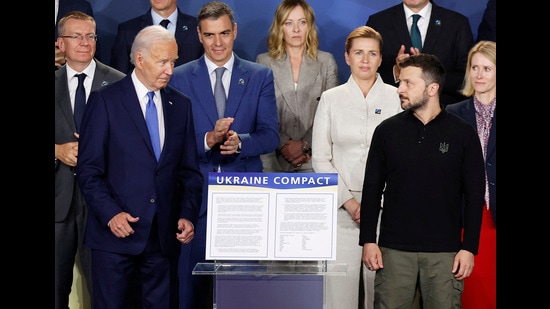Jul 12, 2024 09:19 PM IST
The alliance made plans and promises. But it is struggling to respond to Trump’s rise in the US and the China-Russia axis at its borders
That the North Atlantic Treaty Organization (NATO) has lasted for 75 years is a reflection of the endurance of the US-led Trans-Atlantic security order that came into being after World War II. That erstwhile adversaries of Eastern Europe were keen to join the bloc shows the appeal of the US security umbrella that comes with its provision of collective defence. And that mainstream political opinion, on both sides of the Atlantic, for most of these seven-and-a-half decades, saw merit in this alliance reflected both the elite and popular legitimacy of the project in the western world.

But when NATO’s leaders met this week in Washington DC, these features were under strain. The US-led security order is confronting its most serious challenge in Europe from Russia’s invasion of Ukraine and in the Indo-Pacific from China — and both adversaries of the Western bloc are now closely coordinating with each other, with a little help from Iran and North Korea. The entry of Eastern European States served as a constant reminder to Moscow about the presence of the West at its borders, led to insecurities, and made Russia particularly sensitive to Ukraine’s status vis-à-vis NATO, eventually leading to Vladimir Putin’s invasion. And the rise of Donald Trump shattered the consensus in Washington DC on European security. If one cuts through his extremist rhetoric, Trump was asking a set of questions that resonated with a large segment of his country — why should American citizens care about developments at the far end of Europe; what does the US get for assuming global security responsibilities; why fight Russia when China is the main adversary; why aren’t European States paying more for their security?
The Washington summit aimed to address these concerns and insure the alliance against shocks. US President Joe Biden used the moment to celebrate NATO, explain how the US gained from the alliance, and outline the additions in its membership, and the increased budgetary spending of European States on defence. These messages were largely intended for a sceptical domestic audience in the US about the continued relevance of the bloc and that burden sharing was fair. NATO called out China for being the “decisive enabler” of the Ukraine war and warned Xi Jinping of the consequences if Beijing continued offering Moscow political and material support. This was a sign of how the West viewed the European and Asian theatre as an integrated whole after the China-Russia “no-limits” partnership. The alliance assured Ukraine it was on a path to “irreversible” membership of NATO, offered tangible security assistance and stepped up funding. This was both a recognition that Kyiv needed more sustained help to resist Moscow and also a pre-emptive move to strengthen Volodymyr Zelensky’s hand just in case of a possible Trump presidency.
Yet, it was hard to miss the sense of gloom that permeated the summit. If Trump returns to office, the bloc’s best-laid plans may not even be considered. If Russia makes gains on the Ukrainian battlefield, while western societies continue to get tired and lose the appetite to support Kyiv, all bets are off about the future of European security. A persistent policy of support to Ukraine and its incorporation into NATO doesn’t really offer a pathway for a resolution either. NATO faces a political challenge at home and strategic challenges at its borders, and it doesn’t have easy answers for either.
Unlock a world of Benefits with HT! From insightful newsletters to real-time news alerts and a personalized news feed – it’s all here, just a click away! –Login Now!


